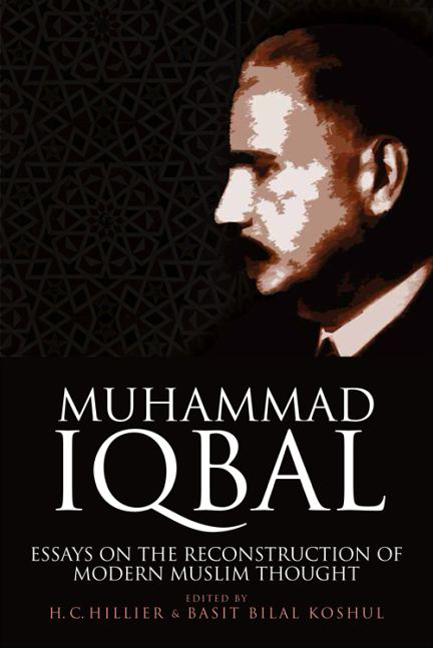Book contents
- Frontmatter
- Contents
- Preface
- 1 Introduction
- 2 The Human Person in Iqbal's Thought
- 3 Achieving Humanity: Convergence between Henri Bergson and Muhammad Iqbal
- 4 The Contemporary Relevance of Muhammad Iqbal
- 5 Pragmatism and Islam in Peirce and Iqbal: The Metaphysics of Emergent Mind
- 6 Between Hegel and Rumi: Iqbal's Contrapuntal Encounters with the Islamic Philosophical Traditions
- 7 Reconstructing Islam in a Post-metaphysical Age: Muhammad Iqbal's Interpretation of Immortality
- 8 Iqbal, Bergson and the Reconstruction of the Divine Nexus in Political Thought
- 9 Muhammad Iqbal: Restoring Muslim Dignity through Poetry, Philosophy and Religious Political Action
- Index
8 - Iqbal, Bergson and the Reconstruction of the Divine Nexus in Political Thought
Published online by Cambridge University Press: 10 October 2017
- Frontmatter
- Contents
- Preface
- 1 Introduction
- 2 The Human Person in Iqbal's Thought
- 3 Achieving Humanity: Convergence between Henri Bergson and Muhammad Iqbal
- 4 The Contemporary Relevance of Muhammad Iqbal
- 5 Pragmatism and Islam in Peirce and Iqbal: The Metaphysics of Emergent Mind
- 6 Between Hegel and Rumi: Iqbal's Contrapuntal Encounters with the Islamic Philosophical Traditions
- 7 Reconstructing Islam in a Post-metaphysical Age: Muhammad Iqbal's Interpretation of Immortality
- 8 Iqbal, Bergson and the Reconstruction of the Divine Nexus in Political Thought
- 9 Muhammad Iqbal: Restoring Muslim Dignity through Poetry, Philosophy and Religious Political Action
- Index
Summary
Introduction: The Crisis
Religion does not teach us to bear ill-will among ourselves. We are Indians, our homeland is India.
Iqbal, ‘Taranah-i-Hindi’, Poetry of Allama Iqbal, (2010: 26)In 1904, Muhammad Iqbal (1877–1938) penned ‘Taranah-i-Hindi’ (‘Song of the Indian People’). The poem was so popular that it became the unofficial national anthem for the Indian independence movement, and has been often quoted by later Indian politicians and by astronauts and was even chanted by Gandhi himself (Wajihuddin 2005). In it, Iqbal praises the natural beauty of India and her people, unified as a nation above religious division. Six years later, however, Iqbal would reject his own poem and its sentiments, penning a new one entitled ‘Taranah-i-Milli’ (‘Song of the Muslim People’), in which he writes: ‘China is ours, Arabia is ours, and India is ours. We are Muslims and the whole world is our homeland.’ Within a few short years, Iqbal's political vision evolved from Indian nationalism to pan-Islamic nationalism. Why? It is simply that, after a few years of living in Great Britain, he came to see that there was something fundamentally wrong with the Western political enterprise, and religion was the answer (see Sevea 2012).
During the same years, the French Jewish philosopher Henri Bergson (1859–1941) had also become a national hero in France for his innovative writings and lectures that spanned multiple fields of human enquiry (for example, biology, psychology, and philosophy). Despite achieving a status that would leave some academics comfortably content (for example, holding the Chair of Philosophy at the College de France, winning a Nobel Prize in Literature, and achieving almost cult status), Bergson never shied away from taking strong political positions. When the Great War broke out in 1914, Bergson used his position as an intellectual leader to criticise imperialism and campaign for France within the world community. The French Government sent him to the United States as a diplomat to advocate for French interests. His relationship with the Wilson Administration continued as he worked to establish the League of Nations (LN; Societe des Nations (SDN) in French).
- Type
- Chapter
- Information
- Muhammad IqbalEssays on the Reconstruction of Modern Muslim Thought, pp. 167 - 200Publisher: Edinburgh University PressPrint publication year: 2015

